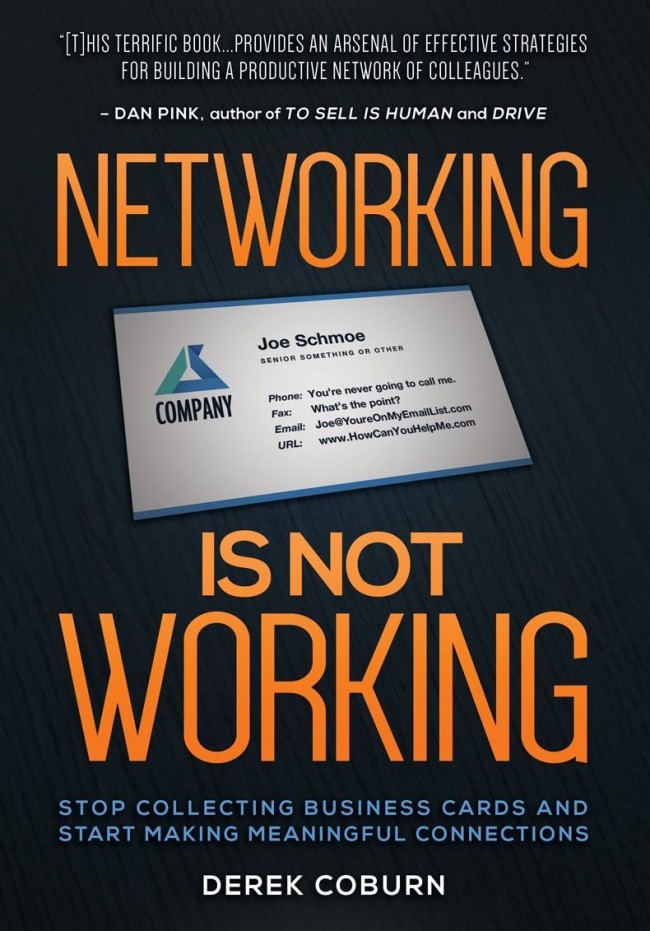 I picked up Networking is Not Working by Derek Coburn because I’m making a more concerted effort to understand and engage with the professional network around my business.
I picked up Networking is Not Working by Derek Coburn because I’m making a more concerted effort to understand and engage with the professional network around my business.
As I’ve sought to engage, I’ve joined professional meet up events, set up one-on-ones, followed up on almost everyone and had more than a few opportunities to just sit there and listen to people’s hollow sales pitches for an hour. I’m looking down the road and thinking–boy, this sure isn’t sustainable.
Coburn describes the problem, it’s the fakers. The one’s who look around and see marks. The bad ones, of whom I have met quite a few already, don’t even try to hide their intentions. They walk right up to you with their business card already in hand and use your attention to tell you to come and visit their real estate office, or go on and on about herbal products that are “so good” you can only buy them from a “healthy living consultant”. The good ones–who are really worse because they waste a ton of your time–try to disguise themselves as helpful. They’re not, they’re just trying to trick you into trusting them enough to give you a sales pitch.
It’s borderline infuriating.
Networking is Not Working is a really short set of instructions for navigating around these people who’ve half-heartedly followed the advice of networking books of the past. He’s trying to patch the framework, and make it useful again. Useless might not be the term for how most people seem to network with each other, but inefficient probably is.
Coburn’s advice distills into two major points:
- Authenticity–not the appearance, but the actual thing–really, really matters. And,
- Meaningfully bringing about solutions to people’s problems, namely by introducing them to someone amazing, without focusing on how they will reciprocate, is how a strong network is built.
Coburn calls back to the concept of authenticity regularly because trust is a cornerstone of strong relationships. Everyone hates being sold to, so much so that even the mere impression is enough to fracture trust and ruin a budding relationship, in some cases.
But the central meat of the advice is in this idea of being a resource for your clients and your network. If you have already vetted out an excellent home builder, making that good recommendation to your client, and then the builder doing a great job, causes good-will to flow in all directions. By making referrals, you strengthen the relationship with your network. By providing a good recommendation, your client can thank you for helping to solve a problem. In both cases, those people are more likely to offer you up for a referral when the opportunity arises, than not. Or maybe they never will, but you’ve done something good for them, and that’s worth it.
Since I have never put a lot of effort into purposefully networking, I’ve gone into the new endeavor attempting to follow my gut. Being open, accepting and personable to everyone; Following up with everyone; being kind, helpful when possible, and only offering a pitch when someone asks for it. This book was validating. It helped articulate the goal I was circling with my intuition. I think if you have the right attitude toward networking to begin with, Coburn’s book will help clarify the goal. If not, just stop networking. You’re not getting anywhere and everyone is annoyed with you.
This was a short book. It cost me a little less than 3 hours to read, which I did in two sittings. It’s like a really long blog post. If you are involved in regular networking, and not sure why–or you should be involved in networking, but are hesitating–Networking is Not Working will offer some useful insight, and perhaps a dose of courage.

Recent Discussion